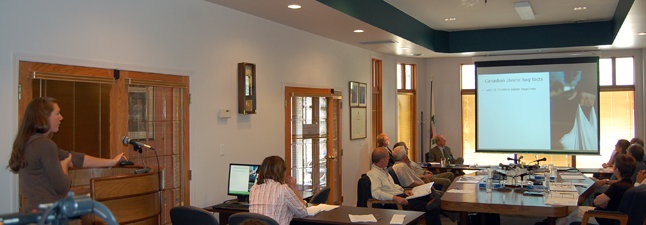
By David F. Rooney
Plastic bags. On average they are used for less than five minutes but they’ll last 1,000 years or more. Drive almost anywhere and you’ll see them blowing in the wind, trapped in trees, bushes and fences and — in their greatest concentrations — filling an area in the North Pacific about the size of Texas.
But they’re not just unsightly. Turtles and seabirds find them in the water and think they are jellyfish so they eat them. There are so many plastic bags in the ocean that consume them until their bellies are literally full of plastic they cannot digest and cannot excrete. Chris Jordan, an American photographer recently travelled to Midway Island in the Pacific Ocean where he captured a series of hugely disturbing but relevant images of seabirds killed by the plastic bag shreds, disposable lighters, bottle caps and other plastic crap tossed away without a thought. His images are worth looking at it and I challenge anyone to view them without being touched in a fundamental and visceral way.
Here’s what he had to say about his photographic project:
“These photographs of albatross chicks were made in September, 2009, on Midway Atoll, a tiny stretch of sand and coral near the middle of the North Pacific. The nesting babies are fed bellies-full of plastic by their parents, who soar out over the vast polluted ocean collecting what looks to them like food to bring back to their young. On this diet of human trash, every year tens of thousands of albatross chicks die on Midway from starvation, toxicity, and choking.
“To document this phenomenon as faithfully as possible, not a single piece of plastic in any of these photographs was moved, placed, manipulated, arranged, or altered in any way. These images depict the actual stomach contents of baby birds in one of the world’s most remote marine sanctuaries, more than 2,000 miles from the nearest continent.”
Plastics have only been mass-produced for about 60 years and they have altered not only our way of life but, as they enter the food chain, could have an immense impact on the future of life on the planet.
At some level, the penetration of plastics into our way of life disturbs a lot of people in different ways, hence the movement to get rid of them. For some time now, the North Columbia Environmental Society has been lobbying to have them banned here, just as the town of Leaf Rapids did in Manitoba. The local response from responsible corporate citizens like Cooper’s has helped. It not only sells reusable grocery bags it has posters up in the store promoting their use and asking shoppers if they remembered to bring their bags.
Hailey Ross of the NCES told City Council recently that despite the buy-in by business of all kinds, people still need to be reminded to bring their bags when they go shopping. And even though 78 per cent of Revelstokians who responded to an NCES survey about plastic bags said they favour banning them, many, many people still use them.
“Many store owners have told us they should just be banned,” she said, adding that here in BC, Nelson and Tofino have are vry close to banning them outright. They are also banned in Ireland and several Australian states.
Part of the problem is what do you do with the ones we already have? You can’t put them in the Columbia Shuswap Regional District recycling bins because they are not regarded as a recyclable resource. As a result they end up blowing in the wind or in our landfills.
Ross said the City’s landfill takes in 7,000 tonnes of rubbish during 2009. About 15 per cent of that was plastic. On top of that, the City paid out $20,000 in wages just to have litter, much of it plastic, picked up off streets, sidewalks and municipal lands.
Even if we banned them outright, we might still wind up paying someone to pluck plastic bags off the ground. In Leaf Rapids, which has a population of just 500 people, the municipal government paid out $5,000 to keep up with the plastic that still wound up in their community.
That shouldn’t surprise anyone. Canadians use, on average between 9 and 15 billion bags.
City Council did make a commitment in March 2009 to reduce plastic bag use in Revelstoke. Part of that commitment included a $2,500 grant to the NCES to look at the issue from a local perspective. Councillors accepted Ross’ report for information. What will it do? We’ll have to wait and see.
If you’d like to watch a short satirical film about the life of a plastic bag please go to: futurestates.tv/episodes/plastic-bag



